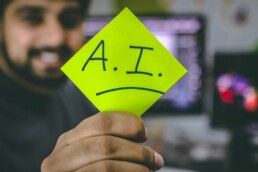
Will AI Do Away with UX Research Jobs? Taking the Long View
I predict that AI will not take over UX research jobs but will instead become the assistant we’ve always needed. There is precedent for this.
The camera was invented in 1837 with the daguerreotype by Louis Jacques Mandé Daguerre. The art world, which was largely relied on to record historical events at the time, panicked that it would take away their jobs. What happened afterward was an explosion of artistic expression that is still rocking the art world today. You see, the camera freed artists from having to record historical events and allowed them to try different styles and themes—abstraction, surrealism, expressionism, etc… The camera also became a tool for artists and photography, a new art form on its own.
AI in art
To create images from prompts, AI generators rely on databases of already existing art and text. These comprise billions of images that have been scraped from the internet and artists aren’t happy about it.
Query: DaVinci style portrait of Taylor Swift
 Given my brief Taylor Swift test above, I don’t think artists have anything to worry about yet. It’s important to remember that these AI-generated images are riding on the coattails of real artists. Any perceived value is based on the value that the artist brings—not the technology. A DaVinci is valuable because DaVinci’s “hand” made it.
Given my brief Taylor Swift test above, I don’t think artists have anything to worry about yet. It’s important to remember that these AI-generated images are riding on the coattails of real artists. Any perceived value is based on the value that the artist brings—not the technology. A DaVinci is valuable because DaVinci’s “hand” made it.
AI in UX Research
So, what would it look like after the AI panic is over for it to become a tool for the UX research world?
I think AI tools could shine in research doing analysis on the research’s raw data. I know some UXers on LinkedIn have tried this recently and it failed miserably. It’s not there yet. I hope that in the next year or two that research repositories will offer accurate and efficient AI-contextual tagging and maybe even a rough draft of the findings by testing objective.
My company uses Dovetail and I recently met with some of their reps. They anticipate having AI-contextual tagging sometime next year. I expect their competitors are doing the same.
Short-term Cons
There are pitfalls in the meantime. We are in for a rollercoaster of bad AI results, bad actors, and a lack of regulations for the short- to medium-term. It depends on how fast governments get over the politics and create real regulations with enforcement. It could take several years.
Certain parts of the business world think they can replace UX research and real users and instead generate findings from an AI query—basically removing both the user and the UX researcher from user research. This will be a failure on all counts.
- Not our users
- No context for findings
- Diminishing returns as AI-generated findings populate the internet
I’ve said many times that AI-generated UX research reports that don’t come from real users and real researchers aren’t user research. Period. Full stop. Any company that goes down that path does so at its peril. Just as AI is riding the coattails of artists, it is also currently riding the coattails of UX researchers. Flooding the internet with AI-generated “research”, creates a lot of noise that will be the downfall of companies with poor AI research practices.
My advice would be to hang in there and provide real value to your business stakeholders. Make them see that you are providing them with the strategic knowledge they need to succeed. Good luck!
Author’s Note: This article was written by an artist and a UX strategist/researcher without AI-intervention!
About Jillian: Jillian Hudson is NN/g UX certified in Research and Management. She worked as a UX Product Designer/Usability Expert for American Airlines and as a UX Strategist and Researcher for Bank of America, and Wells Fargo Bank. She is currently the Principal UX Research Strategist at RXO. Contact Jillian through the UXr Guild Slack channel.

